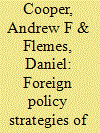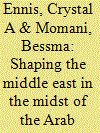| Srl | Item |
| 1 |
ID:
123530


|
|
|
|
|
| Publication |
2013.
|
| Summary/Abstract |
This Introductory Review examines the major debates concerning the rise of emerging powers in the global system. It points to the fundamental difference between the contours of ascendancy in the first quarter of the twenty-first century from previous historical eras with reference to the number of countries placed in this category, the privileging of economic dimensions of power, and the much more elaborate and open levels with regard to institutionalization. Ample attention is paid to the BRICS, but consistent with the image of multipolarity, it also gives some emphasis to the question of whether the changing global system provides enhanced space for middle powers. After highlighting these highly relevant contextual considerations, the core of the Review moves to an analysis centred on more specific puzzles about the foreign policy strategies of emerging powers. One major puzzle is whether the preference of rising states is to work through established institutions or to utilize parallel and/or competitive mechanisms. Another concerns the balance between material interests, status-enhancement, and identity issues as motivators for policy preferences. Still another focuses on the degree to which China should be differentiated from the other BRICS, or indeed whether the BRICS share values such as a common politics of resentment or want to differentiate themselves on a normative-oriented basis in alterative groupings such as IBSA. A more sophisticated awareness of the limitations as well as of the capacities of the BRICS - with an appreciation of the intricate mix of concerns about solidarity and sovereignty, as well as conceptual tensions between realism and complex interdependence - is not only important for assessing the future trajectory of the BRICS role in the world, but in locating space for categories of countries such as middle powers. The major puzzle for middle powers is whether or not they will be able to mobilize attributes, notably the leveraging of 'network power', that provide them with comparative advantage. Although in overall terms the global system has not progressed towards multipolarity in a linear fashion underwritten by alternative actors, it is precisely due to this imprecision - and level of academic and operational contestation - that the articles assembled in this Special Issue have such salience.
|
|
|
|
|
|
|
|
|
|
|
|
|
|
|
|
| 2 |
ID:
155575


|
|
|
|
|
| Summary/Abstract |
The Treaty on the Prohibition of Nuclear Weapons has been hailed by supporters as a historic achievement that they hope will be, in the words of the Hiroshima atomic bombing survivor Setsuko Thurlow, “the beginning of the end of nuclear weapons.
|
|
|
|
|
|
|
|
|
|
|
|
|
|
|
|
| 3 |
ID:
163761


|
|
|
|
|
| Summary/Abstract |
The concept of power and the ways to measure it are central to the literature on regional security providers. The predominant model has power rooted in material capabilities. This article recognizes that such capabilities are important but contends that for a state to be become a regional security provider, it must meet certain preconditions, foremost amongst them: possession of necessary material and ideational capacity; judicious employment of such power resources; and regional recognition of its leadership. Obvious as it may sound, effective leadership is also heavily contingent upon the domestic performance of regional powers. In this regard, the choice of Algeria and Morocco provides an interesting comparative case to broaden the traditional determinants of how to categorize regional security providers. Surprisingly, Morocco has been neglected in studies on regional security in the Maghreb and Sahel despite its rising ideational and economic influence in the region. Even Algeria has seen few studies use an integral approach to analyze its roles, orientations and performance as a regional security provider.
|
|
|
|
|
|
|
|
|
|
|
|
|
|
|
|
| 4 |
ID:
123540


|
|
|
|
|
| Publication |
2013.
|
| Summary/Abstract |
While the Middle East and North Africa ( mena ) are undergoing rapid change, many domestic, regional and international actors are vying for space and influence as systems and customs evolve and adopt new forms. This paper characterises and compares the evolving foreign policy strategies of two such regional actors, Turkey and Saudi Arabia. It further assesses the motivations and activities of and challenges to Turkish and Saudi involvement throughout the region since the Arab uprisings. Ultimately these cases provide intriguing insight into the foreign policy purpose and methods of emerging states under conditions of uncertainty.
|
|
|
|
|
|
|
|
|
|
|
|
|
|
|
|
| 5 |
ID:
164360


|
|
|
|
|
| Summary/Abstract |
Examining Kazakhstan’s foreign policy through the lens of its position as the largest landlocked, and transcontinental, country in the world, the paper presents a multidimensional analysis of the unique soft power strategy adopted recently by this nation in promoting its various international initiatives in its region. In doing so, the paper attempts to understand the implications of Kazakhstan’s distinctive geopolitical setting at the heart of Eurasia for regional integration and security-building initiatives that have been proposed and actively supported by this emerging nation. The paper focuses on investigating key political and socioeconomic aspects of the country’s location at the intersection of Europe and Asia and analyses whether a symbiotic relationship exists between Kazakhstan’s multi-vectored foreign policy and the wide range of its international initiatives aiming to promote economic development, partnership and peaceful coexistence between various nations in the region. The key findings and generalizations of the research will facilitate better understanding of the implications of landlocked geography for the direction of foreign policy, using concrete examples and manifestations of political decisions made in the area.
|
|
|
|
|
|
|
|
|
|
|
|
|
|
|
|